-
 Bitcoin
Bitcoin $84,399.2223
1.14% -
 Ethereum
Ethereum $1,590.7544
-0.15% -
 Tether USDt
Tether USDt $0.9999
0.01% -
 XRP
XRP $2.0840
-0.37% -
 BNB
BNB $584.2779
0.68% -
 Solana
Solana $132.2389
4.85% -
 USDC
USDC $0.9998
-0.01% -
 TRON
TRON $0.2465
-1.94% -
 Dogecoin
Dogecoin $0.1564
1.22% -
 Cardano
Cardano $0.6153
-0.01% -
 UNUS SED LEO
UNUS SED LEO $9.3819
0.42% -
 Chainlink
Chainlink $12.4646
0.67% -
 Avalanche
Avalanche $18.9384
-0.03% -
 Toncoin
Toncoin $2.9427
2.16% -
 Stellar
Stellar $0.2372
0.49% -
 Shiba Inu
Shiba Inu $0.0...01194
1.86% -
 Sui
Sui $2.0737
-1.45% -
 Hedera
Hedera $0.1578
0.15% -
 Bitcoin Cash
Bitcoin Cash $327.7507
2.67% -
 Litecoin
Litecoin $74.9490
-1.23% -
 Polkadot
Polkadot $3.5793
0.93% -
 Hyperliquid
Hyperliquid $16.1469
6.39% -
 Dai
Dai $1.0001
0.01% -
 Bitget Token
Bitget Token $4.3160
1.37% -
 Ethena USDe
Ethena USDe $0.9992
0.01% -
 Pi
Pi $0.6121
-1.86% -
 Monero
Monero $218.6484
0.72% -
 Uniswap
Uniswap $5.2073
-0.48% -
 OKB
OKB $51.7154
-1.12% -
 Pepe
Pepe $0.0...07166
1.23%
What is a gas fee in a cryptocurrency?
Ethereum gas fees, compensating miners/validators, fluctuate based on transaction complexity and network congestion; understanding them is crucial for successful transactions.
Mar 12, 2025 at 06:05 pm
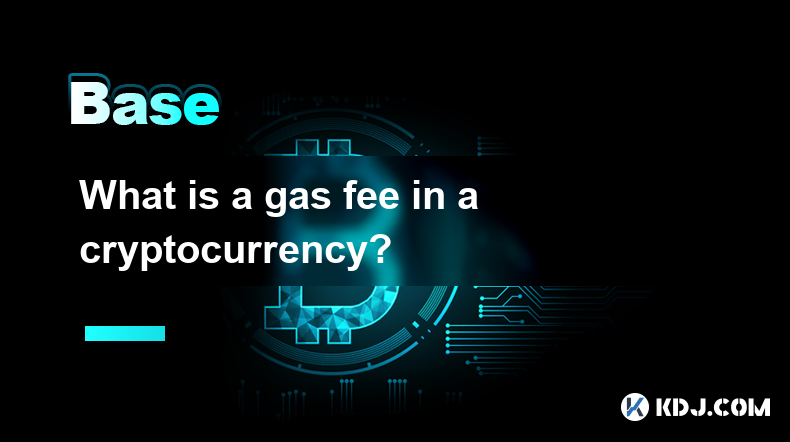
Key Points:
- Gas fees are transaction fees on the Ethereum blockchain (and some other blockchains using similar mechanisms).
- They compensate miners or validators for processing and verifying transactions.
- The amount of gas used depends on the complexity of the transaction.
- Gas prices fluctuate based on network congestion.
- Understanding gas fees is crucial for successfully conducting transactions on Ethereum and similar networks.
What is a gas fee in a cryptocurrency?
In the world of cryptocurrencies, particularly on the Ethereum blockchain and those built using similar architectures, the term "gas fee" frequently arises. It's essentially the cost you pay to execute a transaction on the network. Think of it as a postage fee for sending a digital letter. This fee isn't a fixed amount; it dynamically adjusts based on several factors, making it a crucial aspect of interacting with these blockchains. Without understanding gas fees, users risk failed transactions or unexpectedly high costs.
Why do we need gas fees?
Gas fees serve as an incentive for miners (in proof-of-work systems) or validators (in proof-of-stake systems) to process and verify transactions. These individuals dedicate computing resources to maintain the blockchain's integrity. Gas fees compensate them for their efforts and energy consumption, ensuring the network remains secure and operational. The system is designed to prevent spam and ensure fair prioritization of transactions.
How are gas fees calculated?
The calculation of gas fees involves two key components: gas used and gas price. Gas used represents the computational effort required for a specific transaction. A simple transaction, like sending ETH, uses less gas than a complex smart contract interaction. The gas price, expressed in Gwei (a billionth of an Ether), reflects the current demand for network processing. Higher demand leads to higher gas prices. The total gas fee is the product of gas used and gas price: Total Gas Fee = Gas Used * Gas Price.
What factors influence gas prices?
Several factors interplay to determine gas prices. Network congestion is a primary driver. High transaction volume leads to increased competition for processing, pushing gas prices upwards. The type of transaction also plays a role; complex smart contract interactions typically require more gas than simple transfers. The time of day can also impact gas prices, with peak hours often commanding higher fees. Finally, market sentiment and overall cryptocurrency activity can indirectly influence gas price fluctuations.
How can I estimate gas fees before sending a transaction?
Most cryptocurrency wallets and exchanges provide gas fee estimations before you confirm a transaction. These tools often offer multiple options, allowing you to choose between faster (higher fee) and slower (lower fee) transaction processing times. It's crucial to review these estimations carefully before confirming, as unexpectedly high fees can be costly. You can also use various online gas fee trackers and calculators to get an idea of current market rates before initiating your transaction.
What happens if I don't pay enough gas?
If you don't pay enough gas to cover the transaction's computational requirements, your transaction will likely fail. The miners or validators will not process it, and your funds will remain in your wallet. You will not lose your funds, but you will waste time and possibly need to try again with a higher gas price. This highlights the importance of accurately estimating gas fees.
How can I minimize gas fees?
Minimizing gas fees involves strategic timing and transaction structuring. Sending transactions during off-peak hours often results in lower gas prices. Batching multiple transactions into a single transaction can sometimes reduce the overall gas consumption. Using tools and services that optimize gas usage can also be beneficial. Remember, however, that aggressively minimizing gas fees might lead to significantly longer transaction confirmation times.
Step-by-step guide to understanding gas fees:
- Identify your transaction type: Determine whether it's a simple token transfer or a complex smart contract interaction.
- Check current gas prices: Use a gas fee tracker or your wallet's estimation tool.
- Estimate gas used: Your wallet will typically provide this estimation based on your transaction.
- Calculate total fee: Multiply gas used by the gas price.
- Review and confirm: Carefully check the total fee before finalizing the transaction.
Frequently Asked Questions:
Q: Are gas fees the same on all blockchains? A: No, gas fees are specific to blockchains that use a similar transaction fee mechanism to Ethereum. Other blockchains, like Bitcoin, have different fee structures.
Q: Can gas fees be refunded? A: No, gas fees are non-refundable. They are the cost of using the network.
Q: What is Gwei? A: Gwei is a unit of measurement for gas prices on the Ethereum network. 1 Gwei = 0.000000001 Ether.
Q: Are gas fees always the same for the same type of transaction? A: No, gas fees fluctuate based on network congestion and other factors. The price changes constantly.
Q: How can I avoid high gas fees? A: Monitor gas prices, send transactions during off-peak hours, and use tools that help optimize gas usage. However, be aware of potential trade-offs with slower transaction speeds.
Disclaimer:info@kdj.com
The information provided is not trading advice. kdj.com does not assume any responsibility for any investments made based on the information provided in this article. Cryptocurrencies are highly volatile and it is highly recommended that you invest with caution after thorough research!
If you believe that the content used on this website infringes your copyright, please contact us immediately (info@kdj.com) and we will delete it promptly.
- Charts💹 reveals $ETH potentials
- 2025-04-17 10:15:25
- The Next Big Best Cryptocurrency to Buy This Month and Why These 4 Projects Are Popping Up on Analyst Watchlists
- 2025-04-17 10:15:25
- Bitcoin May Be Riding a Wave of Volatility in 2025
- 2025-04-17 10:10:17
- Eric Trump and Asher Genoot to Make First On-Stage Appearance for American Bitcoin at Consensus 2025
- 2025-04-17 10:10:17
- Bitcoin Is Now a Safe Haven, Its Proponents Say
- 2025-04-17 10:05:26
- XRP Has Regained Market Attention Following the Recent Slash in Ripple's Penalty by the SEC
- 2025-04-17 10:05:26
Related knowledge

What does Floor Price mean in the NFT market
Apr 17,2025 at 12:42am
The term Floor Price is a critical concept within the NFT (Non-Fungible Token) market, serving as a key indicator for both buyers and sellers. In essence, the floor price represents the lowest price at which an NFT from a particular collection is currently listed for sale on a marketplace. This price point is crucial for understanding the perceived valu...
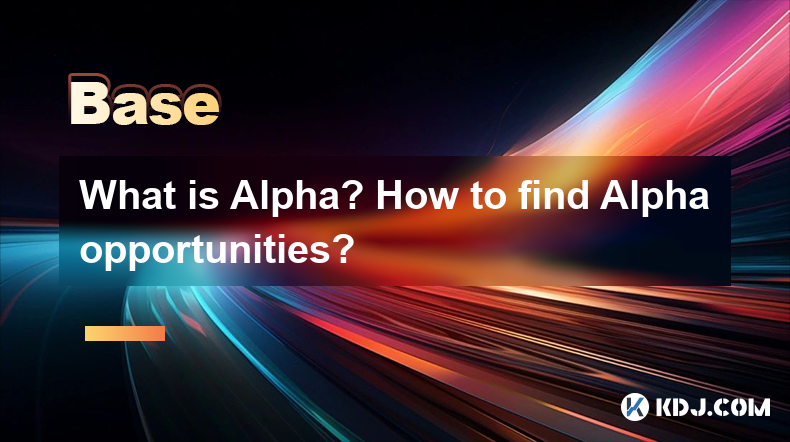
What is Alpha? How to find Alpha opportunities?
Apr 16,2025 at 12:42pm
What is Alpha?Alpha is a term widely used in the financial world, including the cryptocurrency market, to describe the ability of an investment to outperform a benchmark. In the context of cryptocurrencies, alpha refers to the excess return an investor achieves over the market's average return. For example, if the overall crypto market grows by 10% in a...
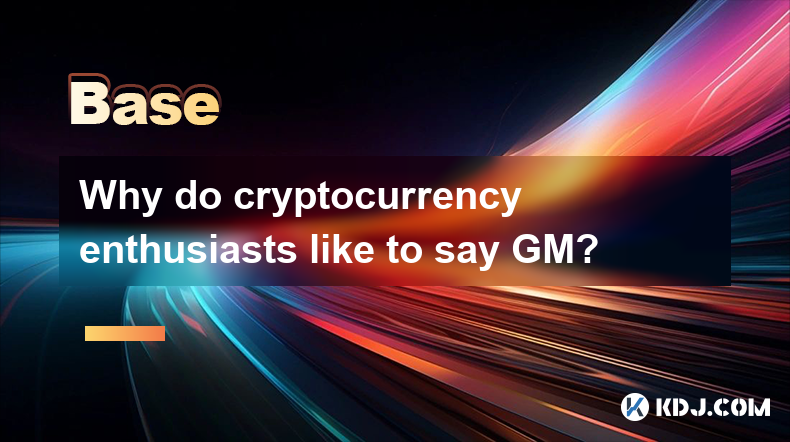
Why do cryptocurrency enthusiasts like to say GM?
Apr 16,2025 at 06:21am
In the world of cryptocurrency, the term 'GM' has become a popular greeting among enthusiasts. GM stands for 'Good Morning,' and its widespread use within the crypto community has a deeper significance than just a simple greeting. This article delves into the reasons why cryptocurrency enthusiasts like to say GM, exploring its origins, cultural signific...

What do WAGMI and NGMI mean?
Apr 16,2025 at 08:08pm
In the world of cryptocurrency, you might often come across the acronyms WAGMI and NGMI. These terms have become part of the crypto slang and are frequently used in discussions, tweets, and forums related to digital currencies. Let's delve into what these terms mean, their origins, and how they are used within the crypto community. Understanding WAGMIWA...
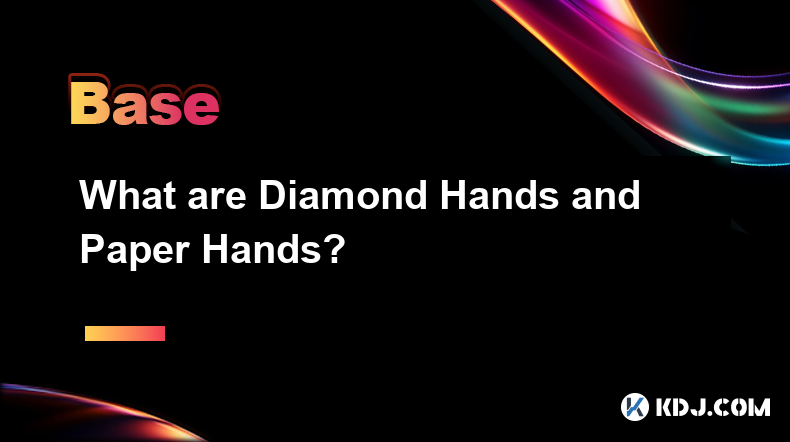
What are Diamond Hands and Paper Hands?
Apr 16,2025 at 10:42am
In the world of cryptocurrencies, the terms Diamond Hands and Paper Hands are frequently used to describe the behavior and mindset of investors, particularly in volatile markets. These terms originated from online communities and have become a significant part of the crypto lexicon, often used to describe the level of resilience and commitment an invest...
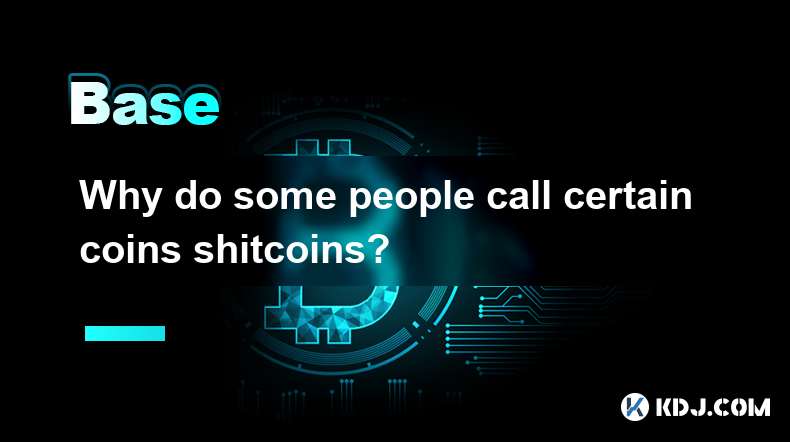
Why do some people call certain coins shitcoins?
Apr 17,2025 at 03:21am
Understanding the Term 'Shitcoin'The term 'shitcoin' is a colloquialism within the cryptocurrency community that is used to describe cryptocurrencies that are perceived as having little to no value or potential. It is a derogatory term, often used to express disdain or skepticism about the viability of certain digital assets. The use of 'shitcoin' is su...

What does Floor Price mean in the NFT market
Apr 17,2025 at 12:42am
The term Floor Price is a critical concept within the NFT (Non-Fungible Token) market, serving as a key indicator for both buyers and sellers. In essence, the floor price represents the lowest price at which an NFT from a particular collection is currently listed for sale on a marketplace. This price point is crucial for understanding the perceived valu...

What is Alpha? How to find Alpha opportunities?
Apr 16,2025 at 12:42pm
What is Alpha?Alpha is a term widely used in the financial world, including the cryptocurrency market, to describe the ability of an investment to outperform a benchmark. In the context of cryptocurrencies, alpha refers to the excess return an investor achieves over the market's average return. For example, if the overall crypto market grows by 10% in a...

Why do cryptocurrency enthusiasts like to say GM?
Apr 16,2025 at 06:21am
In the world of cryptocurrency, the term 'GM' has become a popular greeting among enthusiasts. GM stands for 'Good Morning,' and its widespread use within the crypto community has a deeper significance than just a simple greeting. This article delves into the reasons why cryptocurrency enthusiasts like to say GM, exploring its origins, cultural signific...

What do WAGMI and NGMI mean?
Apr 16,2025 at 08:08pm
In the world of cryptocurrency, you might often come across the acronyms WAGMI and NGMI. These terms have become part of the crypto slang and are frequently used in discussions, tweets, and forums related to digital currencies. Let's delve into what these terms mean, their origins, and how they are used within the crypto community. Understanding WAGMIWA...

What are Diamond Hands and Paper Hands?
Apr 16,2025 at 10:42am
In the world of cryptocurrencies, the terms Diamond Hands and Paper Hands are frequently used to describe the behavior and mindset of investors, particularly in volatile markets. These terms originated from online communities and have become a significant part of the crypto lexicon, often used to describe the level of resilience and commitment an invest...

Why do some people call certain coins shitcoins?
Apr 17,2025 at 03:21am
Understanding the Term 'Shitcoin'The term 'shitcoin' is a colloquialism within the cryptocurrency community that is used to describe cryptocurrencies that are perceived as having little to no value or potential. It is a derogatory term, often used to express disdain or skepticism about the viability of certain digital assets. The use of 'shitcoin' is su...
See all articles























































































